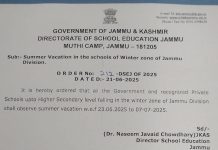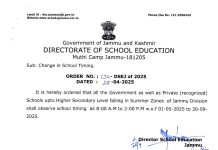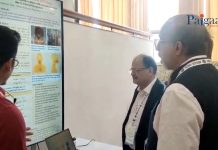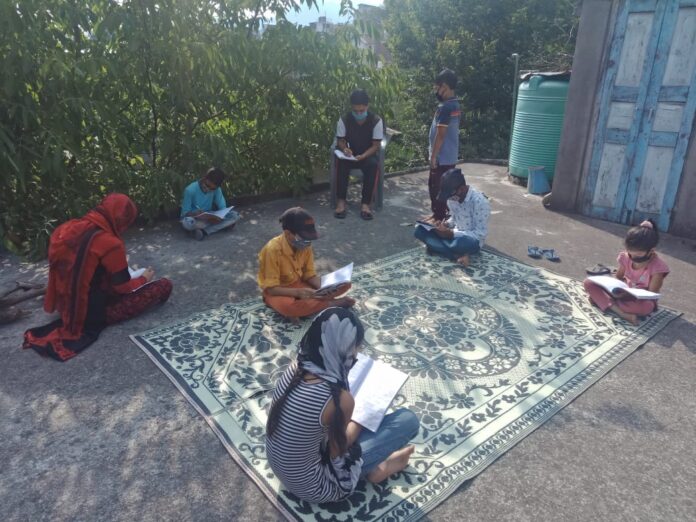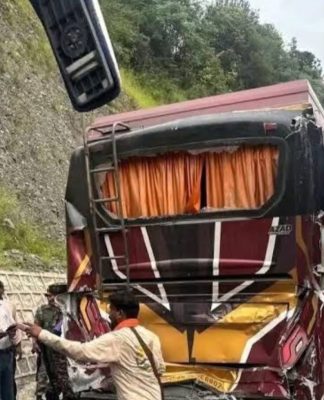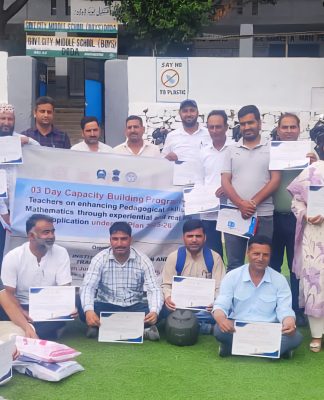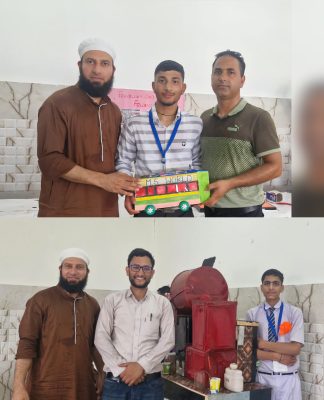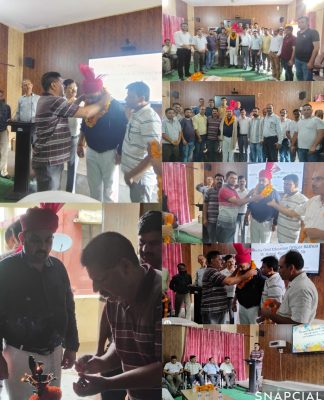Education during COVID Crisis: A case of Jammu region
By Sadaket A Malik, social worker, columnist with an experience of more than 13 years in education sector.

The COVID 19 pandemic led to the widespread closure of all the educational institutions around the globe. This has led to switching from the traditional or in some circles blended learning to the online or digital learning overnight. There has been a paradigm shift in educational picture of the world. In order to provide access to learning to the student force the Digital education has been given a fillip. Several organizations are at work to overcome the learning handicaps or to fill the gap of conventional classroom. Several schemes and programmes have been initiated with the use of technology. Schools are leveraging platforms like Google classroom, Microsoft Education and conferencing apps like Zoom, several other initiatives, challenges, lack of access and rural digital divide has been witnessed especially in rural settings especially in the Union Territory of Jammu and Kashmir.
The Jammu and Kashmir as far as the disparity of education is concerned, especially the Kashmir region and more or less Jammu region has already been under curbs and information scarcity due to the Abrogation of Article 370 and designation of state into two Union territories. There has already been a disruption of education in Kashmir region due to curbs and now the problem is followed by the outbreak of the COVID 19 pandemic.
Despite these two folded odds, the educational administrators of the state veered for a cohesive educational plans and programmes to reach the students. The shutdowns and COVID crisis has put certain question marks on the future of the students. In this article, an evaluative study is being done to evaluate the policies and programmes initiated by the Directorate of School Education Jammu during such circumstances. Directorate of school education Jammu with the direction of its Director Ms. Anuradha Gupta with a well knitted teaching fraternity remained proactive in disseminating education and other policy issues.
Some of the path breaking initiatives of the directorate of school education under the dynamic leadership of Ms. Anuradha Gupta for the sake of students are elucidated here:
Teaching and Learning

With the support of professionally trained people there has been a successful implementation of the home classes project in the region and is still going on. The Home classes with the initiation of different networks and institutes like the collaborative ventures- Jammu and Kashmir Knowledge Network, ICT hub, development of the Professional learning applications has got a popular support from the students and parents. The home classes project has also been endorsed by the Union Ministry of HRD (ministry of Education) in its Indian Digital Learning Report 2020 that has been released by the Union Education Minister. Thousands of the video lessons has been circulated among the students through social media platforms and links of the websites of school education department Jammu and its associated digital ICT portals, watsapp groups were framed in each school for the students having access to information. On the other hand owing to the rural urban digital divide and lack of smart phones among the most vulnerable sections of the society, an initiative was taken to deliver the some portion of text books at the door steps of the children. The home delivery initiative of text books distribution got a very impressive response by the parents and society. The bold initiatives of teachers in reaching the students door steps are really a warrior job in crisis situation. The role of teacher in this director had been appreciable. The learning has been mixed with home assignments with the help of worksheets and many other means. The preparedness by the Schools in this direction has been very impressive. There are several issues like lack of access or less access or 2G network which is a point of bottlenecks on the way of continuation of the studies of the children. The e-learning app by (DSEJ) to augment its efforts of providing hassle free education to each and every student of the Jammu division and beyond. The community classes by the teachers have been an oracle for action to keep the students in touch with learning and overcoming of the conventional methods of teaching and learning.
Co Curriculum:
The learning need to be mixed with the other co-curricular activities in order to create an atmosphere of happiness and exhibit the talent of the children, there has been a tremendous need to focuss on this component. Nevertheless, the School education department has initiated a programme under the style of “Ghar Baithe Activity Karo Na” in which students has been given an opportunity to exhibit their talent while staying at home. The programme is being widely endorsed by the stakeholders. In Jammu region, the government as well as private school children are displaying their talent at their own level that has been highlighted by them in their social media accounts and other web portals. The job of the teacher is to engage the children in fun field activities of frequent basis as they may not feel stressful at home. The unrealistic expectations by the parents and other household members and academic component should not go all alone in the crisis situation.
The mid-day meals that has been a major component of the government schools, in present day crisis, there education department has delivered the mid-day meals at homes of the learners. It is a historical step indeed. The
Study Skill Training:
The union territory of Jammu and Kashmir which has a majority of students living in rural areas and has less access to the smart phones, lack of internet services or less access to internet, there is a need to develop study skills among the children in all the districts of the state. The Study skill training of the department of education Jammu to more than 14000 students is a holistic step. This must be needed at local even District or Tehsil level by holding the camps with the support of the teachers of that area. The school education department in collaboration with the Bharti foundation has initiated several plate forms but this need to be done at local level also in the rural settings. An orientation of the local teachers be made feasible get advantage of the study skills among the children so that the education access can reach those who lack urban education centres.
Psychological Support:
One of the important bottlenecks which we confront in any crisis, war or curb is to take care of the psychological aspect of the learners who has been at home. This is very serious component and has been viewed seriously by the educational planners and policy makers. In the present day pandemic there has been several initiatives by the psychologists world-wide to address this issue. The NGOs and their role is appreciable in this direction, The International, national, regional and local psychological association has done yeomen’s services for the sake of children. The child line, helplines, Tele-Counselling helplines and Counselling cells at school level are proving very better during pandemic. The very recent “Manodarpan” initiative has been initiated by the Ministry of HRS (Ministry of education), Government of India which is a National Programme to provide the psychological support to the students during the crisis time. In Jammu region too, the Directorate of School education Jammu has taken a lead by its well knitted “Psychological Task force” and Local School level counselling cells. The school education department has nominated District and Zonal Counselling Co-ordinators to coordinate various counselling activities in respective districts of Jammu Division to provide psychological support and counselling to students, teachers, parents and members of community for mental health and emotional well-being. These DCCs and ZCCs has been entrusted the responsibility to reach the learners and provide them support services. The role of UNICEF in India needs a special mention here. Counselling at the time of crisis can prove better if it is reaching the target populace followed by a rigorous approach. The AWO BAAT KARAIN” initiative has been very popular one which has provided feedback to most of the students in Jammu and Kashmir.
In spite of the revolutionary educational initiatives during Crisis period, the central initiatives of Government of India are given a wide publicity so that e-content developed by the several national agencies may reach the students.
What is needed is to have a policy driven towards inclusiveness, the Post COVID 19 education need new and unique initiatives as there might be several issues like increase of dropout rate. The world Sustainable Development Goal-4 which was supposed to increase is a distant dream now. The challenge is that financing of education. The financing gap has reached at lower ebb in the low income countries (UNSECO Global Education monitoring report (2020). Same might be the case at regional and local level. In the wake of such consequences, we need to plan beforehand policy to overcome such issues. Furthermore, in teaching learning and Psychological aspect there is a need of close coordination or tale counselling on frequent basis to overcome emotional, psychological issues followed by the continuity of education that has been disrupted due to crisis. In teaching learning sphere, Parents and Teachers must establish an equilibrium and new normal in the present day circumstances. In teaching learning process by online, million dollar questions remained i.e. how to manage online classes? do the teacher have a right hardware i.e. internet access, managerial skills, what should be the length of the class ? Do we have smart phones with our extended learners who are inhibiting in rural areas? Such are the areas that need a fleeting attention to extend education for all.


